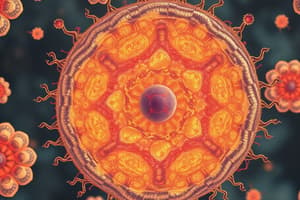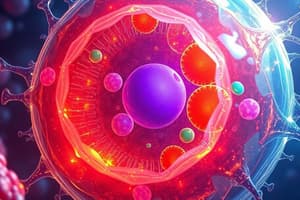Podcast
Questions and Answers
What is the fundamental unit of life known as?
What is the fundamental unit of life known as?
- Molecule
- Tissue
- Atom
- Cell (correct)
Which type of cells lack nuclei and other membrane-bound organelles?
Which type of cells lack nuclei and other membrane-bound organelles?
- Eukaryotic cells
- Prokaryotic cells (correct)
- Mitochondrial cells
- Lysosomal cells
Which part of a cell is responsible for carrying the DNA of the cell?
Which part of a cell is responsible for carrying the DNA of the cell?
- Mitochondria
- Endoplasmic reticulum
- Ribosomes
- Nucleus (correct)
Which organelle is responsible for providing energy to the cell?
Which organelle is responsible for providing energy to the cell?
Which cellular component separates proteins and lipids into vesicles?
Which cellular component separates proteins and lipids into vesicles?
Which type of cell makes up all animals, plants, fungi, and some bacteria?
Which type of cell makes up all animals, plants, fungi, and some bacteria?
Which part of a cell is responsible for building new cells?
Which part of a cell is responsible for building new cells?
What is the primary function of ribosomes in a cell?
What is the primary function of ribosomes in a cell?
What is the endoplasmic reticulum responsible for in a cell?
What is the endoplasmic reticulum responsible for in a cell?
Which cellular component is primarily involved in breaking down waste material in a cell?
Which cellular component is primarily involved in breaking down waste material in a cell?
Flashcards are hidden until you start studying
Study Notes
A fundamental unit of life is known as a cell, which can exist independently or form complex structures such as tissues and organs within living beings. Cells have specific functions and there are more than one hundred different types found throughout nature. They contain components called organelles, which help carry out essential tasks like providing energy, making protein and building new cells.
Cells come with their own distinct structure, with the most common being prokaryotic cells, which lack nuclei and other membrane bound organelles, and eukaryotic cells, which possess these features. Eukaryotes make up all animals, plants, fungi, protozoa, algae, and some bacteria while prokaryotes comprise Archaea and several members of Bacteria.
The basic parts of any eukaryotic cell, regardless of its type, include a nucleus where genetic information resides, endoplasmic reticulum, mitochondria, Golgi apparatus, ribosomes, lysosomes, peroxisomes, microtubules, flagella, centrosome and cytoplasm. Each part plays a crucial role in maintaining cellular activity and ensuring proper functioning of the entire body.
For instance, the nucleus holds the DNA of a cell; it's responsible for carrying out various processes related to growth, reproduction, maintenance, and response to changes from outside the body. The Golgi compartment further separates proteins and lipids into vesicles before they are released back into the cytosol. Additionally, endoplasmic reticula serve as transport systems between cellular functional sites. These organelles work together to ensure effective cell operation.
In summary, cells are the fundamental units of life, performing vital functions through specialized organelles. An understanding of cell structure and function helps us comprehend how living entities operate effectively.
Studying That Suits You
Use AI to generate personalized quizzes and flashcards to suit your learning preferences.




